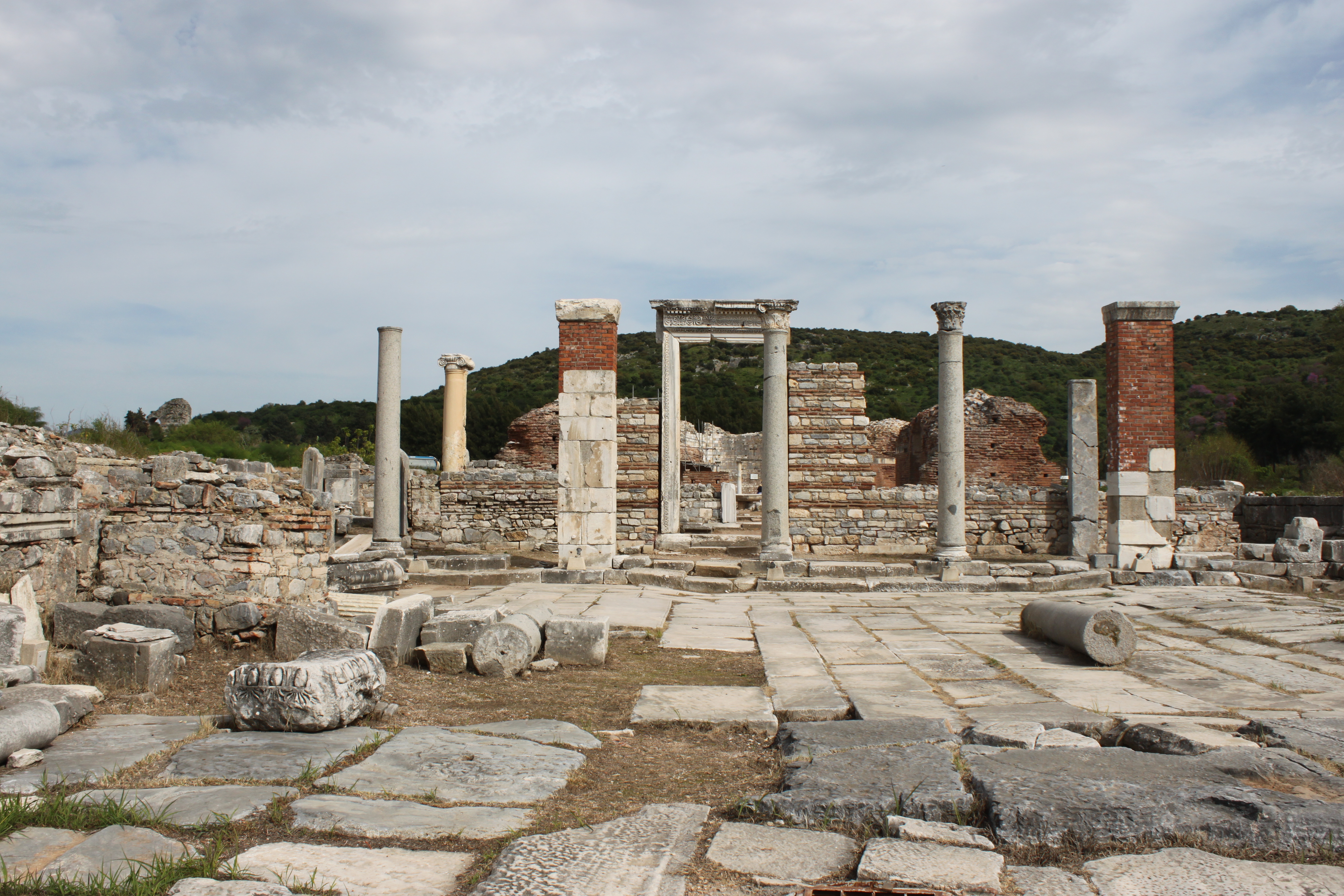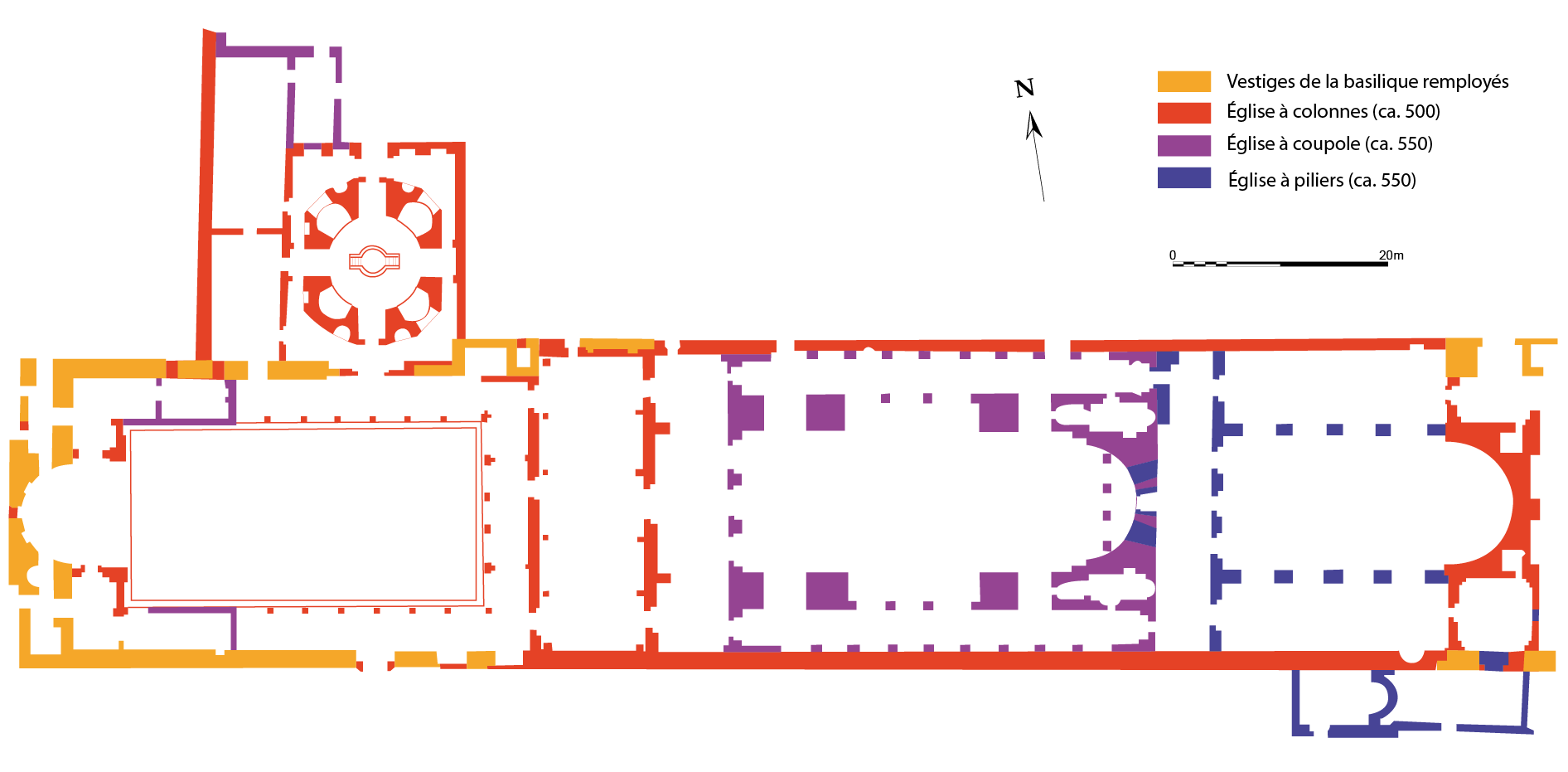Church of Mary on:
[Wikipedia]
[Google]
[Amazon]
 The Church of Mary ( tr, Meryem Kilisesi) was an ancient
The Church of Mary ( tr, Meryem Kilisesi) was an ancient
 The church is dated to the early 5th century, coinciding with the
The church is dated to the early 5th century, coinciding with the
/ref> Around 500, the church was expanded into a monumental cathedral, whose apse and pillars partially still stand today on the site. The church served as a
Detailed description of the Church of Mary in Ephesus with many photographs
{{coord, 37, 56, 41.78, N, 27, 20, 21.13, E, type:landmark, display=title Ephesus Shrines to the Virgin Mary Ruined churches in Turkey 5th-century churches Byzantine church buildings in Turkey
 The Church of Mary ( tr, Meryem Kilisesi) was an ancient
The Church of Mary ( tr, Meryem Kilisesi) was an ancient Christian
Christians () are people who follow or adhere to Christianity, a monotheistic Abrahamic religion based on the life and teachings of Jesus Christ. The words ''Christ'' and ''Christian'' derive from the Koine Greek title ''Christós'' (Χρι ...
cathedral
A cathedral is a church that contains the '' cathedra'' () of a bishop, thus serving as the central church of a diocese, conference, or episcopate. Churches with the function of "cathedral" are usually specific to those Christian denomination ...
dedicated to the Theotokos
''Theotokos'' (Greek: ) is a title of Mary, mother of Jesus, used especially in Eastern Christianity. The usual Latin translations are ''Dei Genitrix'' or ''Deipara'' (approximately "parent (fem.) of God"). Familiar English translations are " ...
("Birth-Giver of God", ''i.e.'', the Virgin Mary
Mary; arc, ܡܪܝܡ, translit=Mariam; ar, مريم, translit=Maryam; grc, Μαρία, translit=María; la, Maria; cop, Ⲙⲁⲣⲓⲁ, translit=Maria was a first-century Jewish woman of Nazareth, the wife of Joseph and the mother o ...
), located in Ephesus
Ephesus (; grc-gre, Ἔφεσος, Éphesos; tr, Efes; may ultimately derive from hit, 𒀀𒉺𒊭, Apaša) was a city in ancient Greece on the coast of Ionia, southwest of present-day Selçuk in İzmir Province, Turkey. It was built in t ...
(near present-day Selçuk
Selçuk is a town in İzmir Province in the Aegean Region of Turkey. It is located northeast of the ancient city of Ephesus, that was once home to the Temple of Artemis, one of the Seven Wonders of the Ancient World.
Its previous Greek name, Ag ...
in Turkey
Turkey ( tr, Türkiye ), officially the Republic of Türkiye ( tr, Türkiye Cumhuriyeti, links=no ), is a list of transcontinental countries, transcontinental country located mainly on the Anatolia, Anatolian Peninsula in Western Asia, with ...
). It is also known as the Church of the Councils because two councils of importance to the history of Early Christianity
Early Christianity (up to the First Council of Nicaea in 325) spread from the Levant, across the Roman Empire, and beyond. Originally, this progression was closely connected to already established Jewish centers in the Holy Land and the Jewish ...
are assumed to have been held within. The church is located in the south stoa of the Olympieion (Temple of Hadrian Olympios) next to the harbor of Ephesus.
History
 The church is dated to the early 5th century, coinciding with the
The church is dated to the early 5th century, coinciding with the Council of Ephesus
The Council of Ephesus was a council of Christian bishops convened in Ephesus (near present-day Selçuk in Turkey) in AD 431 by the Roman Emperor Theodosius II. This third ecumenical council, an effort to attain consensus in the church th ...
, the third Ecumenical council in 431, suggesting that it may have been built specifically for that Third Ecumenical Council
An ecumenical council, also called general council, is a meeting of bishops and other church authorities to consider and rule on questions of Christian doctrine, administration, discipline, and other matters in which those entitled to vote are ...
, during which the title of Theotokos
''Theotokos'' (Greek: ) is a title of Mary, mother of Jesus, used especially in Eastern Christianity. The usual Latin translations are ''Dei Genitrix'' or ''Deipara'' (approximately "parent (fem.) of God"). Familiar English translations are " ...
for the Mother of God was declared orthodox. The latest archaeological evidence suggests that the church was built on the ruins of an earlier Roman
Roman or Romans most often refers to:
*Rome, the capital city of Italy
*Ancient Rome, Roman civilization from 8th century BC to 5th century AD
*Roman people, the people of ancient Rome
*''Epistle to the Romans'', shortened to ''Romans'', a letter ...
basilica
In Ancient Roman architecture, a basilica is a large public building with multiple functions, typically built alongside the town's forum. The basilica was in the Latin West equivalent to a stoa in the Greek East. The building gave its name ...
-like building abandoned around the 3rd century, known as the "Hall of the Muses"."Church of Mary", Ephesus Ancient City/ref> Around 500, the church was expanded into a monumental cathedral, whose apse and pillars partially still stand today on the site. The church served as a
cathedral
A cathedral is a church that contains the '' cathedra'' () of a bishop, thus serving as the central church of a diocese, conference, or episcopate. Churches with the function of "cathedral" are usually specific to those Christian denomination ...
and was the seat of the Bishop of Ephesus throughout Late Antiquity
Late antiquity is the time of transition from classical antiquity to the Middle Ages, generally spanning the 3rd–7th century in Europe and adjacent areas bordering the Mediterranean Basin. The popularization of this periodization in English ha ...
.
An inscription in the Church of Mary indicates there was an even more ancient Synagogue in Ephesus.
See also
*Metropolis of Ephesus
The Metropolis of Ephesus ( el, Μητρόπολις Εφέσου) was an ecclesiastical territory ( metropolis) of the Ecumenical Patriarchate of Constantinople in western Asia Minor, modern Turkey. Christianity was introduced already in the cit ...
*Seven churches of Asia
The Seven Churches of Revelation, also known as the Seven Churches of the Apocalypse and the Seven Churches of Asia, are seven major Churches of Early Christianity, as mentioned in the New Testament Book of Revelation. All of them are located in ...
*House of the Virgin Mary
The House of the Virgin Mary ( Turkish: ''Meryemana Evi'' or ''Meryem Ana Evi'', "Mother Mary's House") is a Catholic shrine located on Mt. Koressos (Turkish: ''Bülbüldağı'', "Mount Nightingale") in the vicinity of Ephesus, from Selçuk in ...
, also in Ephesus, believed to be the place where Virgin Mary lived until the Dormition
The Dormition of the Mother of God is a Great Feast of the Eastern Orthodox, Oriental Orthodox, and Eastern Catholic Churches (except the East Syriac churches). It celebrates the "falling asleep" (death) of Mary the ''Theotokos'' ("Mother of ...
*Roman Catholic Marian churches
Catholic Marian churches are religious buildings dedicated to the veneration of the Blessed Virgin Mary. These churches were built throughout the history of the Catholic Church, and today they can be found on every continent including Antarctica. ...
*History of Roman and Byzantine domes
Domes were a characteristic element of the architecture of Ancient Rome and of its medieval continuation, the Byzantine Empire. They had widespread influence on contemporary and later styles, from Russian and Ottoman architecture to the Italian R ...
References
Resources
*Stefan Karweise, ''The Church of Mary and the Temple of Hadrian Olympios.'' Helmut Koester, ed., Ephesos: Metropolis of Asia (Harvard University Press, 1995), 311–20.External links
Detailed description of the Church of Mary in Ephesus with many photographs
{{coord, 37, 56, 41.78, N, 27, 20, 21.13, E, type:landmark, display=title Ephesus Shrines to the Virgin Mary Ruined churches in Turkey 5th-century churches Byzantine church buildings in Turkey